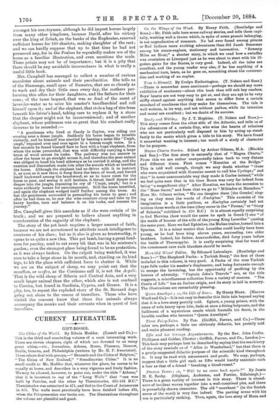Magna Charta Stories. Edited by Arthur Gilman, M.A. (Bladcie and
Son.)—The first story is naturally that of "Magna Charts" From this we are rather unexpectedly taken back to very distant and different times. First comes " Horatius at the Bridge." This is told well enough, though we may doubt whether "those who were acquainted with Horatins meant to call him Cyclops ;" and that" in some unaccountable way they made it Codes instead," while we feel quite sure that in his time Rome was very far indeed from being "a magnificent city." After Horatins, we have the secession to the "Mona Sacer," and from that we go to " Miltiades at Marathon." Here Mr. Gilman writes, "We can imagine them [the Greeks] sing- ing as they went the words of .z•Eschylus." This exercise of the imagination is a little perilous, as Aschylas certainly had not written these words at the time (they occur in the " Persae," or "Story of Salamis," exhibited in 476 B.C.) It is almost equally surprising to find Hervina (how would the name be spelt in Greek ?) one "of the maids of honour of the wife of the young King Leonidas" quoting the same poet. Here we find Ephialtes, the Malian traitor, turned into a Spartan. It is a minor matter that Leonidas could hardly have been young, as be had been king eleven years, succeeding two elder brothers. Indeed, his father, Anaxandrides, died forty years before the battle of Thermopylze. It is really surprising that for want of the commonest care such blunders should be made.






































 Previous page
Previous page